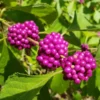NEED SUPPORT WITH YOUR ORDER? Get in touch
Not satisfied with your purchase?
Enter your Order ID on website, and we'll resolve it right away.
Original price was: $89.99.$59.99Current price is: $59.99.
Add year-round beauty to your landscape with this beautyberry live plant. The Callicarpa dichotoma, also known as purple berry bush, is a resilient deciduous shrub known for its stunning vibrant purple berries in fall and delicate flowers in spring. This easy care shrub thrives in various conditions and attracts birds, making it a perfect wildlife garden plant for any outdoor space.
Mar 03
Mar 08 - Mar 10
Mar 13 - Mar 17
USDA Hardiness Zone
Soil Type
Sunlight Exposure
Expected Planting Period
Shipping and return policies: Our Alive & Thrive Guarantee covers issues with your plants within the first 30 days. Get in touch with us via email, and our team will review your concerns and, if necessary, provide you with a one-time replacement at no cost.
If you're unsure about your hardiness zone, feel free to reach out to us. Our team will answer your questions and help you find the plants that are truly suitable for your environment, climate, and personal preferences.
Transform your garden into a haven of color and life with the exquisite beautyberry live plant. The Beautyberry Bush (Callicarpa dichotoma) is a truly stunning addition to any landscape, offering unparalleled visual interest throughout the seasons. Celebrated for its vibrant purple berries in the fall, this resilient deciduous shrub ensures year-round appeal. From delicate white to pinkish flowers blooming between May and July, it gracefully transitions into a spectacular display of berries that persist well after the leaves have fallen, providing a crucial food source for birds and captivating beauty for your garden. Thriving in USDA zones 6-10, this adaptable callicarpa dichotoma is a must-have for any gardener seeking both aesthetics and ecological benefit.
Native to East and Southeast Asia, this versatile shrub demonstrates remarkable adaptability to various soil conditions, including loam, clay, silt, and sand. It flourishes in full sun to partial shade and requires medium watering, making it a relatively easy-care plant suitable for both novice and experienced gardeners. The fast growth rate ensures that you’ll quickly reap the benefits and beauty of this exceptional shrub, particularly its distinct purple berry bush appearance. Whether used as a striking focal point or incorporated into mass plantings, the Callicarpa dichotoma enhances any outdoor space with its unique charm and color.
Investing in a beautyberry live plant brings a multitude of advantages to your garden, enhancing its aesthetic appeal and ecological value. This easy care shrub is designed to offer continuous joy and beauty with minimal effort.
Caring for your beautyberry live plant is straightforward, ensuring it thrives and provides a spectacular display year after year. This resilient shrub is known for its adaptability, making it an excellent choice for both novice and experienced gardeners. Understanding its basic needs will help you maximize its vibrant berry production and overall health.
For sunlight, the callicarpa dichotoma flourishes in a range from full sun to partial shade. For the most abundant berry production, aim for at least 6 hours of direct sunlight per day. While it tolerates some shade, too much shade can reduce flowering and fruit set. When it comes to watering, maintain moderate moisture; the soil should be consistently moist but never waterlogged. During dry spells, especially in its first year, ensure regular watering. Once established, it becomes more drought-tolerant. This easy care shrub is not overly particular about soil, adapting to loam, clay, silt, and sand, but it performs best in well-draining soil with a neutral to slightly acidic pH.
The beautyberry live plant is hardy in USDA zones 6-10, tolerating a wide range of temperatures. Fertilization is generally not heavily required; a balanced slow-release fertilizer applied in early spring can promote vigorous growth and berry production. Pruning is best done in late winter or early spring before new growth begins, as flowers and berries form on new wood. You can prune to maintain shape, size, or to encourage a more compact habit. Common problems are few, but watch for powdery mildew in humid conditions or leaf spot; ensuring good air circulation can help prevent these issues. This robust purple berry bush is generally pest-resistant, making it a truly low-maintenance addition to your garden.
This offering is for a healthy beautyberry live plant, specifically a Callicarpa dichotoma, standing approximately 12-14 inches tall. It is delivered as a 1 Gallon Potted Shrub, ensuring a well-established root system for successful transplanting. The plant’s mature size typically reaches 3-6 feet in height and spread, offering a substantial presence without overwhelming your garden. Its fast growth rate means you will quickly see it establish and flourish, developing its distinctive form and abundant berries. The plant will arrive carefully packaged in its pot with soil, ready for its new home. With optimal care, this particular wildlife garden plant is expected to provide decades of beauty, bringing its unique charm and vibrant color to your outdoor space for 20-30 years.
You must be logged in to post a review.

Reviews
There are no reviews yet.